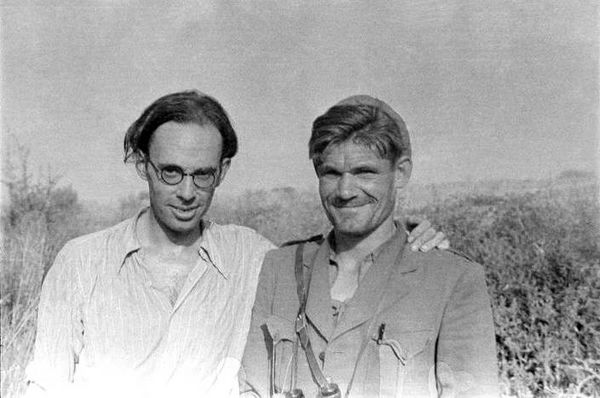Claud Cockburn facts for kids
Quick facts for kids
Claud Cockburn
|
|
|---|---|
|
|
|
| Born |
Francis Claud Cockburn
12 April 1904 |
| Died | 15 December 1981 (aged 77) |
| Occupation | Journalist |
| Spouse(s) | Hope Hale Davis Jean Ross Patricia Byron |
| Children | Claudia Cockburn Sarah Caudwell Alexander Cockburn Andrew Cockburn Patrick Cockburn |
| Parents |
|
| Relatives | granddaughters: Laura Flanders Stephanie Flanders Daisy Cockburn Olivia Wilde |
Francis Claud Cockburn (born April 12, 1904 – died December 15, 1981) was a famous British journalist. He is known for a saying often quoted in journalism: "believe nothing until it has been officially denied." This means you should be careful about believing things until they are officially confirmed or denied.
Claud Cockburn was also related to well-known novelists Alec Waugh and Evelyn Waugh. He lived in Ireland for many years.
Contents
Claud Cockburn's Early Life
Claud Cockburn was born in Peking, China, on April 12, 1904. His father, Henry Cockburn, was a British Consul General. His mother was Elizabeth Gordon Stevenson.
Claud's great-grandfather was a Scottish judge named Henry Cockburn, Lord Cockburn. Claud went to Berkhamsted School in England. Later, he studied at Keble College at the University of Oxford. He earned a degree there.
A Career in Journalism
Claud Cockburn started his career as a journalist at The Times newspaper. He worked as a reporter in other countries, like Germany and the United States. In 1933, he left The Times to start his own newsletter called The Week.
While working at The Times, Claud and his co-workers had a fun competition. They tried to write the most boring headline possible. Claud once won with the headline: "Small Earthquake in Chile, Not many dead." Even though this headline became famous, it actually appeared in a joke version of The Times much later.
Reporting on the Spanish Civil War
Claud Cockburn also wrote for a British communist newspaper, the Daily Worker, using the pen name Frank Pitcairn. In 1936, he was asked to report on the Spanish Civil War. He even joined a military unit to report on the war as a soldier.
While in Spain, he wrote a book called Reporter in Spain. He also became friends with Mikhail Koltsov, who was a foreign editor for a big Russian newspaper.
Speaking Out Against Appeasement
In the late 1930s, Claud Cockburn's newspaper, The Week, was very critical of the British Prime Minister, Neville Chamberlain. Chamberlain was known for his policy of "appeasement." This meant trying to avoid war by giving in to some demands from aggressive countries.
Cockburn claimed that much of his information came from a high-ranking official in the Foreign Office. He also believed that the British secret service was watching him because of his newspaper. In 1937, he created the term "Cliveden set." This was used to describe a group of powerful people he believed were secretly supporting Germany. The Week stopped being published shortly after World War II began.
Life After the War
In 1947, Claud Cockburn moved to Ireland. He continued to write for different newspapers and magazines. He had a weekly column in The Irish Times. He once famously said, "Wherever there is a stink in international affairs, you will find that Henry Kissinger has recently visited."
He wrote several novels, including Beat the Devil. This book was later made into a movie in 1953 by director John Huston. Claud helped write the early versions of the movie script.
He also wrote non-fiction books, such as Aspects of English History and The Devil's Decade, which was about the 1930s.
Claud Cockburn wrote several books about his own life, called memoirs. These included In Time of Trouble and A View from the West. Later, these were combined and published as I, Claud... and then Cockburn Sums Up.
Claud Cockburn's Family
Claud Cockburn was married three times. All three of his wives were also journalists.
- His first wife was Hope Hale Davis. They had a daughter named Claudia Cockburn.
- His second wife was Jean Ross. Their daughter was Sarah Caudwell Cockburn, who became a detective story writer.
- His third wife was Patricia Byron, whom he married in 1940. They had three sons: Alexander, Andrew, and Patrick. All three of his sons also became journalists.
Claud Cockburn's granddaughters include RadioNation host Laura Flanders, economics editor Stephanie Flanders, and actress Olivia Wilde.
See also
 | Delilah Pierce |
 | Gordon Parks |
 | Augusta Savage |
 | Charles Ethan Porter |


